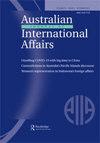网络时代的间谍和学者:研究澳大利亚政策和地区安全中的情报
IF 2.7
3区 社会学
Q2 INTERNATIONAL RELATIONS
引用次数: 0
摘要
澳大利亚国际关系和战略研究学者对情报的有限处理扭曲了堪培拉的学术研究和公众对政策制定的理解。本文概述了澳大利亚以情报为中心的研究,包括限制该领域的传统挑战,其与更传统的奖学金的有限接触,以及未来对情报相关问题进行更多应用历史研究的潜力。它展示了澳大利亚联盟外交和网络安全的关键发展如何受到情报的严重影响,并确定了美中关系和地区安全的趋势,这些趋势正在提升澳大利亚情报机构的战略重要性。如果学术要与澳大利亚治国之道的现实保持联系,未来几年学术界需要对情报在外交和国防政策中的作用和贡献产生更多的兴趣。本文章由计算机程序翻译,如有差异,请以英文原文为准。
Spies and scholars in the cyber age: researching intelligence in Australian policy and regional security
The limited treatment of intelligence by IR and strategic studies academics in Australia distorts the scholarly research and public understanding of policymaking in Canberra. This article provides an overview of intelligence-focused research in Australia, including the traditional challenges which constrained the field, its limited engagement with more conventional scholarship, and the potential for more applied historical study of intelligence-related issues in the future. It demonstrates how key developments in Australian alliance diplomacy and cyber security are heavily influenced by intelligence and identifies trends in the US–China relationship and regional security which are elevating the strategic importance of Australia’s intelligence agencies. More interest from the academic community in the role and contribution of intelligence to foreign and defence policy will be needed in the coming years if scholarship is to remain in touch with the reality of Australian statecraft.
求助全文
通过发布文献求助,成功后即可免费获取论文全文。
去求助
来源期刊

Australian Journal of International Affairs
INTERNATIONAL RELATIONS-
CiteScore
3.20
自引率
13.30%
发文量
44
期刊介绍:
AJIA is the journal of the Australian Institute of International Affairs. The Institute was established in 1933 as an independent and non-political body and its purpose is to stimulate interest in and understanding of international affairs among its members and the general public. The aim of the Australian Journal of International Affairs is to publish high quality scholarly research on international political, social, economic and legal issues, especially (but not exclusively) within the Asia-Pacific region. The journal publishes research articles, refereed review essays and commentary and provocation pieces. ''Articles'' are traditional scholarly articles. ‘Review essays’ use newly published books as the basis to thematically examine current events in International Relations. The journal also publishes commentaries and provocations which are high quality and engaging pieces of commentary, opinion and provocation in a variety of styles. The Australian Journal of International Affairs aims to analyse international issues for an Australian readership and to present Australian perspectives to readers in other countries. While seeking to stimulate interest in and understanding of international affairs, the journal does not seek to promote any particular policies or approaches. All suitable manuscripts submitted are sent to two referees in a full ''double blind'' refereeing process.
 求助内容:
求助内容: 应助结果提醒方式:
应助结果提醒方式:


